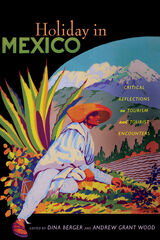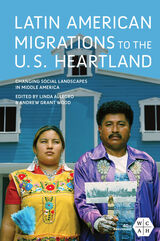
Essays feature research on prototourist American soldiers of the mid-nineteenth century, archaeologists who excavated Teotihuacán, business owners who marketed Carnival in Veracruz during the 1920s, American tourists in Mexico City who promoted goodwill during the Second World War, American retirees who settled San Miguel de Allende, restaurateurs who created an “authentic” cuisine of Central Mexico, indigenous market vendors of Oaxaca who shaped the local tourist identity, Mayan service workers who migrated to work in Cancun hotels, and local officials who vied to develop the next “it” spot in Tijuana and Cabo San Lucas. Including insightful studies on food, labor, art, diplomacy, business, and politics, this collection illuminates the many processes and individuals that constitute the tourism industry. Holiday in Mexico shows tourism to be a complicated set of interactions and outcomes that reveal much about the nature of economic, social, cultural, and environmental change in Greater Mexico over the past two centuries.
Contributors. Dina Berger, Andrea Boardman, Christina Bueno, M. Bianet Castellanos, Mary K. Coffey, Lisa Pinley Covert, Barbara Kastelein, Jeffrey Pilcher, Andrew Sackett, Alex Saragoza, Eric M. Schantz, Andrew Grant Wood

Filled with varied and eye-opening perspectives, Latin American Migrations to the U.S. Heartland reveals how identities, economies, and geographies are changing as Latin Americans adjust to their new homes, jobs, and communities.
Contributors: Linda Allegro, Tisa M. Anders, Scott Carter, Caitlin Didier, Miranda Cady Hallett, Edmund Hamann, Albert Iaroi, Errol D. Jones, Jane Juffer, László J. Kulcsár, Janelle Reeves, Jennifer F. Reynolds, Sandi Smith-Nonini, and Andrew Grant Wood.

Outside of music, the importance of sound and listening have been greatly overlooked in Latin American history. Visual media has dominated cultural studies, affording an incomplete record of the modern era. This edited volume presents an original analysis of the role of sound in Latin American and Caribbean societies, from the late nineteenth century to the present. The contributors examine the importance of sound in the purveyance of power, gender roles, race, community, religion, and populism. They also demonstrate how sound is essential to the formation of citizenship and nationalism.
Sonic media, and radio in particular, have become primary tools for contesting political issues. In that vein, the contributors view the control of radio transmission and those who manipulate its content for political gain. Conversely, they show how, in neoliberal climates, radio programs have exposed corruption and provided a voice for activism.
The essays address sonic production in a variety of media: radio; Internet; digital recordings; phonographs; speeches; carnival performances; fireworks festivals, and the reinterpretation of sound in literature. They examine the bodily experience of sound, and its importance to memory coding and identity formation.
This volume looks to sonic media as an essential vehicle for transmitting ideologies, imagined communities, and culture. As the contributors discern, modern technology has made sound ubiquitous, and its study is therefore crucial to understanding the flow of information and influence in Latin America and globally.
READERS
Browse our collection.
PUBLISHERS
See BiblioVault's publisher services.
STUDENT SERVICES
Files for college accessibility offices.
UChicago Accessibility Resources
home | accessibility | search | about | contact us
BiblioVault ® 2001 - 2024
The University of Chicago Press









